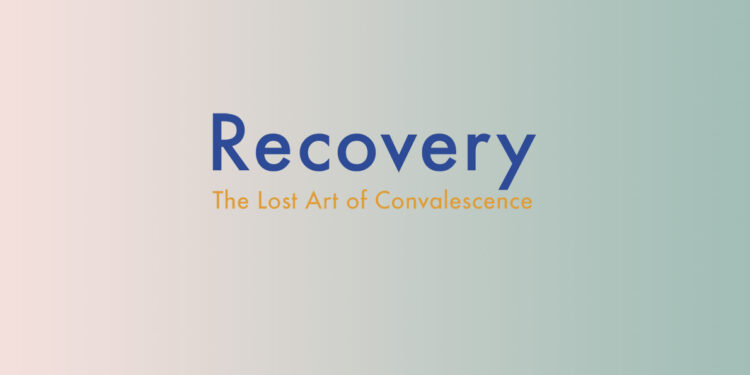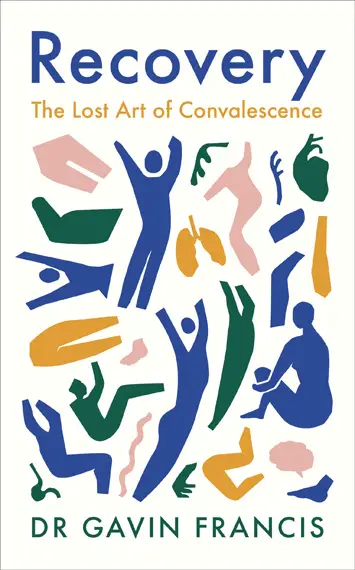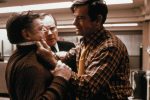Recovery: the Lost Art of Convalescence by Dr Gavin Francis – Review

By Barney Bardsley
Never has the publication of a book been more timely and welcome than this short but sagacious volume by GP and author Dr Gavin Francis. At a moment in our human history when so many people worldwide are suffering from the privations of the Covid pandemic – whether that be on a mental, physical or emotional level – there is an urgent need everywhere, for a tender and uplifting message from somewhere. Recovery offers just such a message. In clear and humane language, Dr Francis sets out a manifesto for health, by emphasising the importance of a simple but highly neglected art: that of taking the time, patience and fortitude to become fully well, after a period of ill health. In other words, true healing. As he says, “(Illness) is a place that all of us must visit, sooner or later; from time to time we all need to learn the art of convalescence.”
It is Dr Francis’ personal experiences that have given him the insights woven into every word and line of this lucid little book. When he was ten years old, he was struck ill with meningitis. His vague and fuzzy-headed memories of that time strike a contrast with another, far more vivid, childhood disaster: an accident on his bike, leading to a splintered shin bone, to surgery, and weeks of immobilisation, followed by further weeks of painstaking rehabilitation. The contrast in these two experiences, made Francis realise, from early in life, that all illnesses – and the recovery from them – inhabit quite different landscapes and timescales for every one of us. And what every personal experience requires, is time, attention, and nuanced care.
What seems to be missing in our contemporary culture, writes Francis – a culture which is so clever at diagnosis and treatment – is our respect for the complexities and subtleties of recovery, when the crisis is past. In the revolving-door ethic of modern day hospitals, there is no place any more for this one essential component of healing: simple convalescence. The patient is often left to her or his own devices, to figure out how to recover after their illness: and this is at the cost of the well being of us all.
 Working on the frontline as a general practitioner, Dr Francis comes up against the hard edges of the system he is a part of, on a daily basis. The vagaries of the ‘sick note’ and the welfare benefits lottery, mean that his patients often cannot take the time they need and deserve, to become fully well. He is often forced to the conclusion, as he listens to the difficulties people face in a working day, that “your work is making you sick.” But, even within these constrictions, he believes that people can and must learn to be far more compassionate with themselves, even when the system fails them, and his counsel is both powerful and personal.
Working on the frontline as a general practitioner, Dr Francis comes up against the hard edges of the system he is a part of, on a daily basis. The vagaries of the ‘sick note’ and the welfare benefits lottery, mean that his patients often cannot take the time they need and deserve, to become fully well. He is often forced to the conclusion, as he listens to the difficulties people face in a working day, that “your work is making you sick.” But, even within these constrictions, he believes that people can and must learn to be far more compassionate with themselves, even when the system fails them, and his counsel is both powerful and personal.
“Short and to the point”
When Francis was in his first year of training as a GP, he got sick. Exhausted by a deeply entrenched sinus problem, he was left with a constant “drilling headache”, which would require surgery to resolve: surgery that might take months to arrange. Meanwhile, he had his training to complete. What to do? He decided to drop to a three day week, with one day off after each working day, to help him cope and recover. It took him longer to qualify as a GP as a result – but when he did, he was in better shape to serve both his patients and himself.
Not everyone has the option to be so flexible in their work choices, but perhaps more of us do, than we might think. If the pandemic has taught us anything at all, then it is surely to question the driving inhumanity of the modern ‘work ethic’, which pushes many to the brink and beyond, and leads increasingly to a sense of disillusionment and burnout. There must be another way, thinks Dr Francis – and we must each play our part in finding it, for the good of ourselves, and of the community.
Written with the concision one might expect from a man of science, Francis does not linger long over his alternative prescription for health. The book is short and to the point. It’s easy to read, almost fitting in the palm of the hand for frequent reference. Moreover, he is clear that allopathic medicine is his single focus, leaving no space here for the huge and growing field of complementary therapies.
But he does take time to explore some of the history of convalescence – singing the praises of nineteenth century nursing pioneer Florence Nightingale, whose simple clarion call for hospitals to “signify the proper use of fresh air, light, warmth, cleanliness, quiet and the proper selection and adminstration of diet”, still holds true, and is sometimes sadly lacking in some of our bigger and busier institutions. And he offers up his own time-honoured suggestions for constructing one’s own healing cures, coming in the form of journeys (the old-fashioned pilgrimages) to somewhere beautiful and restorative; or reading, as an escape from the enforced inactivity of the bed or housebound; or nature itself – walking in it, sitting in it, looking at it – as a real and potent energetic force. As he writes, “A doctor who sets out to ‘heal’ is in truth more like a gardener, who sets out to ‘grow’ – actually, nature does almost all of the work.”
In an era of NHS cuts, which are threatening the close, long term relationship with a single GP that was once enjoyed by so many of us – and which certainly helped me as a twenty year old in deep crisis, and then (different doctor this time) supported me through the illness and death of my husband, by urging me both to “write” and to “get back on your allotment” – it is incumbent upon us all as individuals now, to become wiser in the ways of self care and recovery. As Dr Francis urges: “…give time, space and respect to convalescence if you can. It’s an act we all need to engage in, giving of ourselves; a work of effort and endurance, and to a certain extent of grace…Learn a new language of the body and listen to it with care.”
The next time I fall ill, I shall read this book again, from cover to cover, and I advise you to do the same. In what, for many, has been a dark Covid-infested tunnel of endurance: it is a bright jewel of hope and of healing.
‘Recovery: the Lost Art of Convalescence’ by Dr Gavin Francis is published by Profile Books, £4.99 paperback









